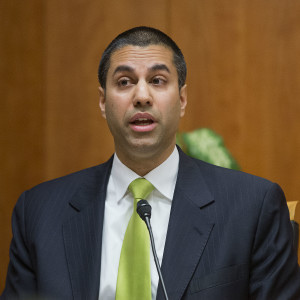There’s no “reading the tea leaves” on which way the judges will lean on the court challenge against the Federal Communications Commission’s net neutrality order next month, according to FCC Commissioner Ajit Pai.
“It’s really hard to say,” Pai told InsideSources this week. “Given that Judge Tatel was on the previous two panels that struck down the decisions, he obviously has some expertise in this area. He’s had a firsthand responsibility for developing this area of the law.”
Last week the D.C. Court of Appeals named the three judges charged with hearing the broadband industry’s court challenge against the new FCC rules, in effect as of June, that regulates Internet service providers (ISPs) as public utility common carriers, similar to telephone service.
One of those named — Circuit Judge David Tatel — ruled against the FCC in two previous cases of the agency attempting to enforce net neutrality without reclassifying ISPs from information service providers to public utilities under Title II of the 1996 Telecommunications Act.
RELATED: These Judges Will Decide the Fate of the Internet in December
After Tatel’s most-recent ruling in January 2014, the FCC spent a year hearing public comment on net neutrality. In February, Chairman Tom Wheeler and the FCC’s two fellow Democratic commissioners voted for reclassification and rules banning ISPs from blocking, throttling or prioritizing certain Internet traffic for edge providers like Netflix, Amazon, YouTube and others willing to pay more.
“As for where the other two judges might come down, it’s a complete crapshoot,” Pai said. “I think a lot of people are trying to read some tea leaves, if there are any, but I’m just going to sit back and watch, and hopefully the court makes a decision that’s appropriate based on the law.”
That decision will likely impact another contentious issue before the agency on whether to force the nation’s largest broadband providers to share their networks with smaller local providers at regulated rates, as incumbent local exchange carriers (ILECs) like AT&T transition from their old copper wire networks to all-digital Internet protocol networks on fiber.
The FCC mandates ILECs share their legacy networks with smaller local providers, or competitive local exchange carriers (CLECs), to boost market competition. Since the FCC voted in August to allow ILECs to move off their copper networks entirely and onto fiber, the fate of CLECs, who depend on those legacy networks for their existence, came into question.
Pai said the FCC should try to promote competition and ensure consumers get more choices and lower prices, but doesn’t think the legacy model of “one company building a pipe and everyone else using it” is the best way to promote competition.
“What we see in cities like Kansas City, for example, with the introduction of Google Fiber, there’s now much more broadband competition,” Pai said. “And on top of that, you now see entrepreneurs sprouting up all over the place because they can count on broadband options.”
“That’s ultimately where I think we’d like to see the marketplace go.”
If Wheeler’s office is any indication, that may not be where the FCC goes. In September Wheeler gave the keynote speech at an awards dinner hosted by Public Knowledge — a pro-net neutrality lobbying group key in pushing the FCC toward Title II — where COMPTEL CEO Chip Pickering received an award.
COMPTEL is the lobbyist group hired to represent CLECs in the business broadband fight, and during his acceptance speech Pickering himself cracked a joke about the influence Public Knowledge has in Wheeler’s office.
RELATED: FCC Chairman Toasts Net Neutrality with Open Internet Lobby
In October the FCC’s Gigi Sohn, a counselor in Wheeler’s office, urged a gathering of CLEC CEOs to engage in the same kind of activism that pushed the FCC to adopt net neutrality, including TV coverage, picketing the White House and even the home of her boss, Wheeler himself. Before joining the chairman’s office, Sohn served as the president and CEO of Public Knowledge for more than a decade.
“The FCC has to be driven by what the facts are and what the law is,” Pai said. “Extraneous considerations like picketing or form emails and letters or things like that shouldn’t ultimately drive the decision. The decision should be based on the facts in the law and ultimately with an eye to what benefits the consumer at large, as opposed to particular special interests here in Washington.”

